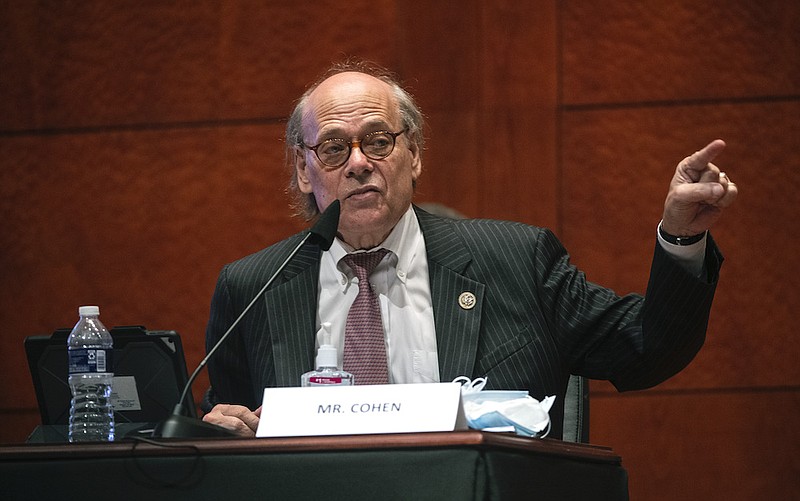A Tennessee congressman who has been critical of the monopoly the Tennessee Valley Authority has over electricity distribution in its seven-state region wants to tear down the utility's territorial fence and allow other power suppliers to come in.
U.S. Rep. Steve Cohen, D-Memphis, has introduced a bill to amend the Federal Power Act and the TVA Act to remove the restrictions adopted in 1959 that block the exchange of most major wholesale power transmissions in and out of the Tennessee Valley. Known as the TVA Reform and Consumer Protection Act, Cohen said his legislation would allow greater competition by eliminating TVA's so-called fence that restricts where power can be sold. Cohen's bill also would subject the federally owned utility to what he said is "much needed oversight" by the Federal Energy Regulatory Commission.
TVA is exempt from the open-access transmission policies set by the commission in 1996, limiting most of the local power companies in the Tennessee Valley from trying to buy wholesale power from generating sources other than those controlled by TVA.
The territorial fence around TVA's service territory was adopted in 1959, in part, at the urging of investor-owned utilities that border TVA to block the government-owned utility from selling power to customers of private utilities using its government advantage to potentially undercut the investor-owned companies. The fence also means TVA is not under commission requirements to wheel power produced by others into the valley to service municipalities and power cooperatives that do not buy their power from TVA.
But as more distributed energy and renewable power are brought on the grid, Cohen said the monopolistic model for TVA to supply all of the power to everyone in the Tennessee Valley no longer makes sense.
"TVA's outdated service model is from the 1950s and badly needs reform," Cohen said in a statement about his proposal. "Ratepayers deserve the benefits -- lower costs and cleaner energy -- that a competitive electricity market will provide."
Cohen's bill was introduced as TVA's largest single customer, Memphis Light Gas & Electric, is preparing to sign a new 20-year power purchase agreement with TVA after considering alternative supply options. Although Cohen has urged the Memphis utility to leave TVA, a consultant study by GDS Associates of 24 power supply proposals found TVA offered the best overall option for the price and reliability of electricity.
GDS said transmitting power to Memphis would add extra costs to any change in power supplier and end up costing Memphis ratepayers at least $70 million a year more than what they now pay for electricity provided by TVA. The consultants estimate the additional costs of turning to another supplier would add about $100 to the average residential electric bill in Memphis compared with what TVA now delivers.
"TVA's long-term partnership proposal demonstrates the greatest value and least risk for MLGW customers when compared to all other proposals," Memphis Light Gas & Electric President J.T. Young told the city utility board last month when the GDS study was finalized.
Memphis Light Gas & Electric and the Memphis City Council are still studying whether to sign the long-term agreement with TVA.
Cohen said consumers could turn to cleaner and cheaper sources of power when they are available if they were not restricted by TVA's fence and limits on wheeling power into the valley.
"TVA's ratepayers deserve to have access to alternative power supplies on a competitive and nondiscriminatory basis," Cohen said. "This measure will give greater access to clean energy and affordable energy bills in the TVA region."
It is unclear how much, if any, impact Cohen's bill might have on most of TVA's distributors. Among the 153 local power companies that get their wholesale power from TVA, 146 have signed 20-year contracts to get most of their wholesale power from TVA. Those contracts could limit any regulatory freedom granted in Cohen's bill to buy and sell or transmit power into the Tennessee Valley.
TVA's retail rates are lower than 80% of the country and TVA industrial rates are lower than 95% of what other utilities charge, TVA Vice President Buddy Eller said in a statement issued in response to Cohen's bill.
"TVA's power system is among the most reliable and resilient in the nation -- 99.999 percent reliable for 21 consecutive years, including through extreme summer and winter temperatures that have challenged other utilities," Eller said. "For nearly 90 years, TVA's congressionally mandated mission has been to serve the public good and improve the lives of the 10 million people we and our public power partners serve every day."
Contact Dave Flessner at dlfessner@timesfreepress.com or at 423-757-6340. Follow on Twitter at @Dflessner1.
